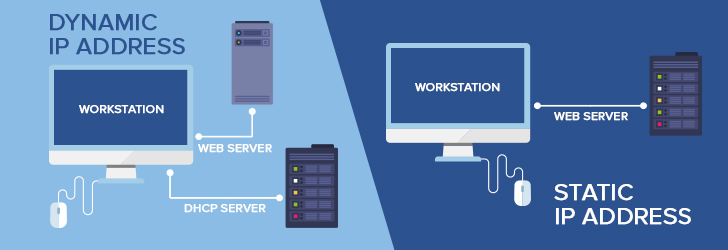
An IP address is an address assigned to a device on the Internet. It is analogous to a postal address where a letter is delivered, and an IP address is a computer's address where internet traffic is delivered. An IP address is assigned to you by your Internet Service Provider (ISP). When you sign up with your ISP, your ISP either assigns you a static IP address or a dynamic IP address depending on the contract. If you need to set up a web server or an email service, you'll need a static IP address. If you are just browsing the Internet, you may just get by with a dynamic IP address.
What is a static IP address?
A static IP address is an address that is permanently assigned to you by your ISP (as long as your contract is in good standing) and does not change even if your computer reboots. A static IP address is usually assigned to a server hosting websites, and providing email, database, and FTP services. A static IP address is also assigned to a commercial leased line, or public organization requiring the same IP address each and every time. Since a static IP address is assigned to you, you'll have to manually configure your machine (router or server) to use the static IP address assigned to you.
Static IP address Advantages
- Address does not change - good for web servers, email servers, and other Internet servers.
- Use DNS to map a domain name to an IP address, and use the domain name to address the static IP address. A similar can be achieved with Dynamic DNS for dynamic IP addresses, but it's not as clean as the static IP address.
Static IP address Disadvantages
- Expensive than dynamic IP address - ISPs generally charge additional fees for static IP addresses.
- Need additional security - Since the same IP is assigned to a machine, hackers try brute-force attacks on the machine over a period of time.
What is a dynamic IP address?
A dynamic IP address is an IP address dynamically assigned to your computer by your ISP. Each time your computer (or router) is rebooted, your ISP dynamically assigns an IP address to your networking device using DHCP protocol. Since your ISP dynamically assigns an IP address to a computing device on reboot, your device may not always receive the same IP address previously assigned to it. Even if your machine is always on and permanently connected, some ISPs do change IP address on the fly even though this is very rare. A sticky nature of DHCP generally reassigns the same IP address to the same machine, it is not guaranteed to receive the same IP address as IP pool may exhaust at times and lease time may expire. To find your dynamic IP address, you may visit What is my IP address page.
Dynamic IP address Advantages
- Cheaper than static IP address.
- Changing IP address gives more privacy.
Dynamic IP address Disadvantages
- Requires DHCP server to obtain an IP address.
- Non-static. Each time the IP address changes, you may have to find your IP address again.
Share this post
Leave a comment
All comments are moderated. Spammy and bot submitted comments are deleted. Please submit the comments that are helpful to others, and we'll approve your comments. A comment that includes outbound link will only be approved if the content is relevant to the topic, and has some value to our readers.

Comments (0)
No comment